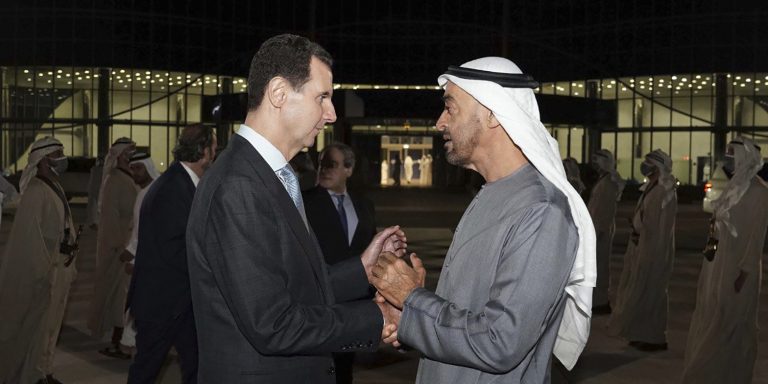INTELBRIEF
March 30, 2022
IntelBrief: UAE Tries to Resurrect Assad

Bottom Line up Front
- The March 18 visit of Syrian President Bashar al-Assad to the United Arab Emirates represented a significant step in Assad’s efforts to re-enter the Arab fold.
- The UAE engagement of Assad reflects its efforts to try to reduce Iranian influence in Syria and combat regional Islamist organizations.
- Critics see the Assad visit as the latest example of the UAE’s support for Arab dictators rather than popular movements that seek more input on national decision-making.
- The Assad visit, and the U.S. reaction to it, reflect broader differences between Abu Dhabi and Washington.
Syrian President Bashar al-Assad arrived in the United Arab Emirates (UAE) on March 18, 2022 and met with Abu Dhabi Crown Prince and de-facto UAE leader Mohammed bin Zayid Al Nahyan (MBZ) and the ruler of Dubai, Mohammed bin Rashid Al Maktoum, who serves as Prime Minister of the seven emirate federation. The visit was his first to an Arab country since the Syrian war erupted 11 years ago. In recent years, Assad has visited the capitals of his two main backers, Russia and Iran, whose military efforts helped secure his regime’s power, at great human cost. The United Nations has verified that at least 350,000 Syrians were killed between March 2011 and March 2021. More than half of Syria's pre-war population of 22 million have fled their homes, of which 6.7 million are internally displaced, and another 6.6 million are refugees abroad. Approximately 14.6 million people inside Syria are in need of some form of humanitarian assistance, according to the United Nations, including almost 5 million in extreme or catastrophic need. Until the UAE trip, Assad had not been welcomed by any country that is aligned with the United States. The UAE demanded no concessions from Assad as a condition of the visit, which represented a significant step toward normalizing the Assad regime in the region.
Whereas the United States and its allies in Europe continue to ostracize Assad, the UAE has been at the forefront of efforts to reintegrate Assad into the Arab fold. Assad’s trip came four months after UAE Foreign Minister Abdullah bin Zayid Al Nahyan met him in Damascus on November 9. Earlier in 2021, UAE officials called for Syria to be readmitted to the Arab League; its membership was suspended in November 2011 for atrocities against Syrian civilians. The UAE reopened its embassy in Damascus in 2018.
The motivations for the UAE’s expanding engagement with the Assad regime are consistent with the country’s overall regional objectives: containing Iran’s regional influence and combatting regional Islamist movements. Iran has built arms factories in Syria, recruited Syrians to fight in Iran-backed militias in eastern Syria, and carved out favorable investment opportunities for Iranian state-linked companies. Iran’s commanding position in Syria has, however, provoked Syrian regime and public resentment, particularly insofar as Iranian and Iran-linked installations have attracted repeated Israeli airstrikes. UAE leaders hope that engagement with Assad will facilitate Emirati and other Arab efforts to counterbalance Iranian influence in Syria. The UAE also views Assad’s regime as a bulwark against Islamist groups that dominate Syria’s armed opposition. Abu Dhabi draws little distinction between mainstream Islamist groups that participate in the political process, such as the Muslim Brotherhood, and violent Islamist jihadist organizations, such as the Islamic State and al-Qaeda. MBZ’s ideology and policies—exemplified by the Assad invitation—have caused many experts to characterize him as a “counter-revolutionary” who has little regard for regional political evolution toward consent of the governed.
The Assad visit has aggravated strains in UAE relations with Washington that were already widening over a number of issues, including the UAE reaction to Russia’s unprovoked invasion of Ukraine, U.S. policy toward the Houthi movement in Yemen and Iran, and U.S. conditions on the sale of the F-35 Joint Strike Fighter to the UAE. Some U.S. officials viewed the UAE’s hosting of Assad, who is extensively backed by Russia, as a further indication of the UAE’s refusal to isolate Russia for its invasion of Ukraine. The UAE abstained on the February 25 UN Security Council resolution vote to condemn the invasion, reportedly in exchange for Russia’s support on a subsequent Council resolution placing an embargo on arms transfers to the Houthis in Yemen. The Houthis recently have conducted several missile strikes on UAE territory, and UAE leaders reportedly resent that the United States has not retaliated militarily for the strikes or re-designated the Houthis as a Foreign Terrorist Organizations (FTO). More broadly, the UAE leadership apparently views the negotiations to restore the 2015 multilateral Iran nuclear deal as a lack of U.S. commitment to roll back Iran’s regional influence. Additionally, the sale of 50 of the sophisticated U.S. F-35 Joint Strike Fighters to the UAE remains stalled over U.S. insistence on assurances that the UAE will prevent China from obtaining access to the F-35 or its technology once the jets are delivered.
U.S. officials sharply criticized the Assad visit. State Department spokesperson Ned Price said on March 20 that “[The United States is] profoundly disappointed and troubled by this apparent attempt to legitimize Bashar al-Assad, who remains responsible and accountable for the death and suffering of countless Syrians, the displacement of more than half of the pre-war Syrian population, and the arbitrary detention and disappearance of over 150,000 Syrian men, women and children." Price stressed that the Biden administration will not lift or waive sanctions imposed on Syria—an implicit threat to sanction UAE investments in Syria if the investment provides direct benefit to the Syrian government. Even though the UAE invitation to Assad signaled its autonomy from U.S. foreign policy, neither Russia, China, nor any other power represents a viable alternative to the United States as guarantor of Gulf security. U.S.-UAE strains over the Assad visit and related issues likely will not undermine the fundamentals of the U.S.-UAE partnership.